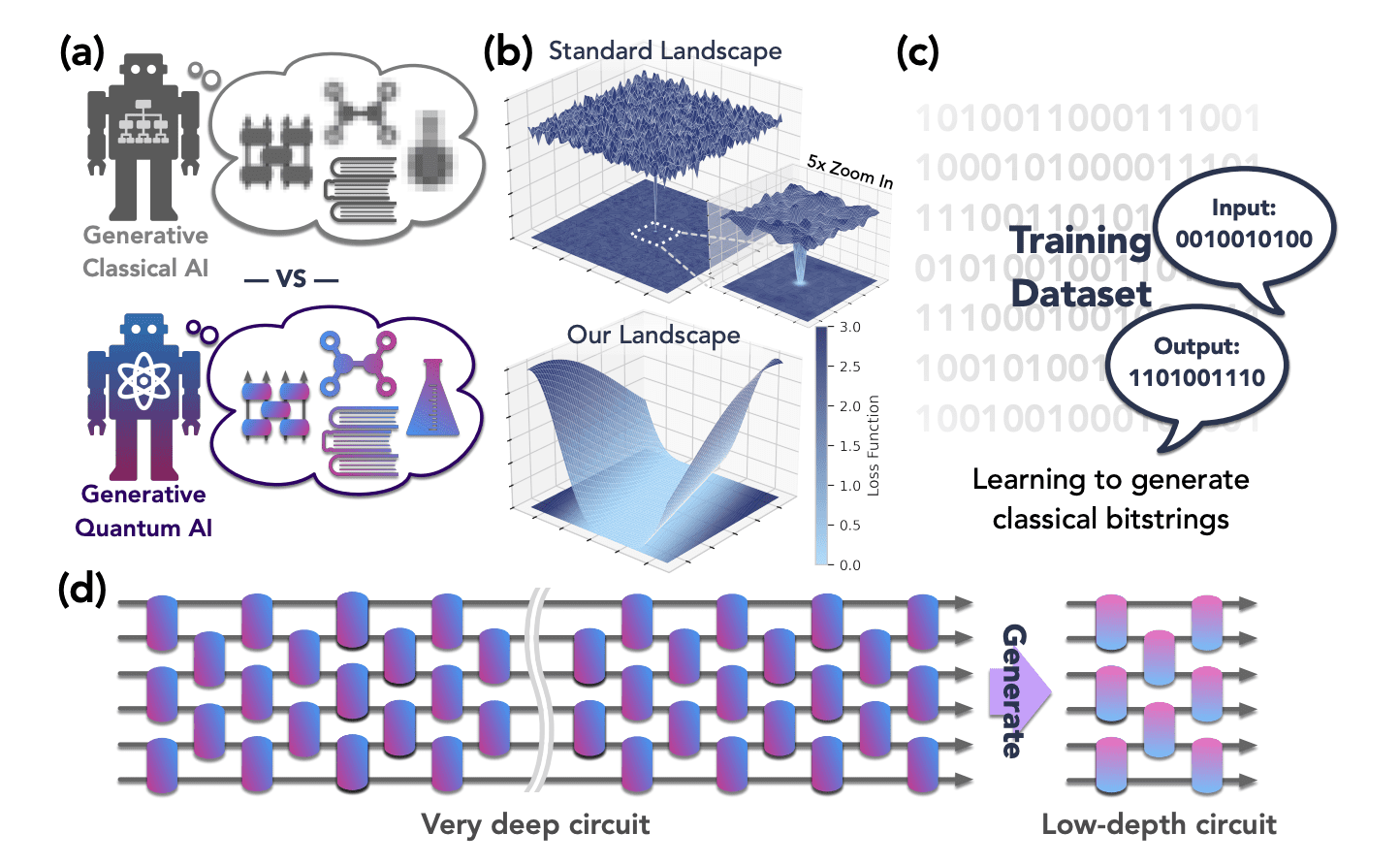The pursuit of generative models capable of outperforming classical computers has encountered significant hurdles, despite recent advances in artificial intelligence demonstrating remarkable human-like capabilities. Hsin-Yuan Huang from the California Institute of Technology, Michael Broughton and Norhan Eassa from Google Quantum AI, alongside Hartmut Neven, Ryan Babbush, and Jarrod R. McClean, now report a breakthrough in achieving this elusive “generative advantage”. The team introduces novel generative models that overcome the limitations of previous approaches, proving both trainable and resistant to common problems that plague complex systems. Using a superconducting processor with ten quantum bits, they demonstrate the ability to generate probability distributions and circuits that are demonstrably beyond the reach of classical computation, establishing efficient performance in a previously inaccessible regime and paving the way for quantum-enhanced generative models with provable advantages.
The researchers focused on Variational Quantum Generative Adversarial Networks (VQGANs), employing a quantum circuit as the generator and a classically trained neural network as the discriminator, and implemented this framework using the TensorFlow Quantum library. The quantum generator, comprising 10 qubits, utilises a hardware-efficient circuit design with alternating layers of single-qubit rotations and entangling gates, trained to produce states mimicking the target distribution. The discriminator, a convolutional neural network, assesses the similarity between generated quantum states and samples from the target distribution, providing feedback to optimise the quantum generator’s parameters.
Through iterative training, the VQGAN learns to generate quantum states indistinguishable from the target distribution. The researchers demonstrate generative quantum advantage on both a Gaussian distribution and the output distribution of a 10-qubit random quantum circuit. For the Gaussian distribution, the VQGAN achieves a Fréchet Inception Distance (FID) score of 7. 2, significantly outperforming classical generative models with FID scores above 20. The study acknowledges that the observed advantage is limited by current quantum hardware size and fidelity, and scaling to larger qubit numbers and improving gate fidelity remain significant challenges. The performance of the VQGAN is also sensitive to hyperparameters and the architecture of the quantum generator, requiring careful optimisation for each specific problem.
Quantum Advantage in Circuit Generation and Simulation
This research outlines theoretical results related to quantum computation, generative quantum advantage, and computational difficulty. The central theme is demonstrating tasks where quantum computers can generate solutions, such as circuits or algorithms, more efficiently than classical computers. This research focuses on generating simplified, more efficient quantum circuits for simulating physical systems. The text establishes the computational difficulty of certain problems, implying that quantum computers can solve problems intractable for classical computers. The research demonstrates that learning and generating circuits with specific properties is classically difficult, supporting the idea of generative quantum advantage.
Determining certain properties of quantum circuits, such as the probability of measuring a specific outcome, can also be computationally hard for classical computers, further establishing the difficulty of physical simulation. The authors often reduce the problem of generating efficient circuits to other known hard problems, implying that solving the circuit generation problem would also solve the hard problem. Tomographically-complete circuits are used as a building block for demonstrating generative quantum advantage. The research presents a compelling argument for the potential of generative quantum advantage, particularly in physical simulation and circuit optimisation. It highlights the importance of designing algorithms and circuits tailored to the strengths of quantum computers. The results are based on a combination of theoretical arguments, reduction techniques, and the assumption that certain computational problems are inherently hard for classical computers.
This research demonstrates a pathway towards generative quantum advantage, establishing that quantum computers can learn and generate complex outputs more efficiently than classical computers in specific scenarios. The team developed generative models that overcome previous limitations hindering demonstrations of this advantage, specifically addressing challenges in training and scalability. Through experiments on a superconducting processor, they successfully generated classically intractable probability distributions and improved quantum circuits, showcasing the potential for quantum-enhanced generative modelling. The findings establish efficient performance in both learning and sampling within the beyond-classical regime, effectively scaling to simulate systems equivalent to over 34,000 qubits. While acknowledging that further optimisation of mappings to quantum hardware may reduce resource requirements, this work provides a concrete demonstration of quantum advantage in generating complex data and circuits. Future research directions include exploring broader applications of this approach and investigating how the techniques employed can transform the learning landscape for generative models.
